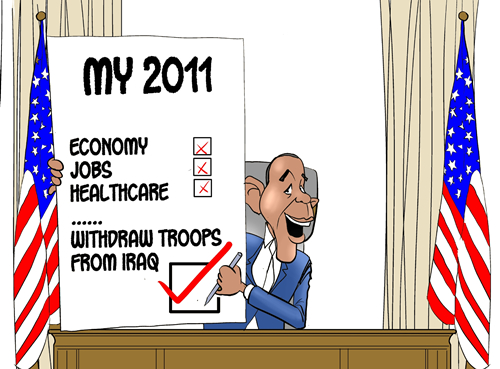Why more American jobs are good news for all
- By Zhang Lijuan
 0 Comment(s)
0 Comment(s) Print
Print E-mail China.org.cn, January 15, 2012
E-mail China.org.cn, January 15, 2012
The global economy's ups and downs in 2011 haven't changed the fact that the American economy remains the world leader. Although a "post-American world" has been discussed and written about for some time now, there is still a general consensus that, as yet, no emerging power is capable of leading on a global scale (See Fareed Zakaria "A Post-American World in Progress"). The American economy will likely continue to lead the world out of recession in 2012.
|
|
|
Between Iraq and a hard place [By Jiao Haiyang/China.org.cn] |
The latest unemployment statistics show that the American economy has created new jobs and the unemployment rate dropped to 8.5 percent in December. This is obviously good news for the American economy, great news for President Barack Obama's reelection campaign, and positive news for future global economic growth.
Jobs are about consumer consumption and the American economy is defined by its consumer sector. Therefore, as long as U.S. consumers feel that conditions are continuing to improve (i.e., through increased job creation), the idea that the American economy is continuing to recover will remain a credible one. According to the Conference Board, the Consumer Confidence Index jumped from 44.5 (1985=100) in August to 64.5 in December 2011. Accordingly, in the same year, the Expectations Index increased to 76.4 in December from 51.9 in August. It seems evident that consumers are more optimistic about the future. This optimism helps to build confidence in both the job market and, consequently, the American economy for this year.
Elections are about jobs, too. A lower unemployment rate in 2012 could be critical to President Obama's reelection chances. Jobs are economic, but elections are political. If politicians stray too far from viable economic policies, harmful institutional problems may be created. The truth is that, in today's world, economists are much more prone to making mistakes than ever before, because politicians are much more prone to making meaningless arguments than ever before. Economists like to use data to predict and describe problems, but these problems cannot be fixed without appropriate action from politicians. Of late, politics has suffered from the self-interested and power-hungry motives of some of those who inhabit the political class. To what extent American politicians will serve the people and the economy instead of their own self interests is a most serious concern. No matter what, the unemployment rate will be a critical factor in the 2012 election.
One of the most important issues in the U.S. today is concerned with the scale and size of government. Former President Bill Clinton argues that America needs a smart government, limited but significant, for a strong economy. However, Republicans and Democrats are moving too far in opposite directions during the current political game. With a distorted political climate, the question of the increasing power of government and its function, which seems favored by the Obama administration, could remain unanswered in the long run. This could damage the American economy.
Finally, American jobs will eventually impact on the pace of the global economic recovery. The U.S. is the world's largest market, so a sound American economy with lower unemployment can only be positive for the rest of the world. This is particularly true in emerging markets like China, India and East Asian nations because, interestingly enough, almost all emerging economies are highly interdependent with the U.S.
However, it would be a mistake to simply attempt to replicate what others have done. China's model and experiences are different from America's or Africa's. Likewise, America's model and experiences differ greatly from China's or Japan's. The transition of the global economy is more likely to be individually unique and diversified. It is not about either socialism or capitalism; it is about how well the different economic and political regimes can work together within the specific historical and cultural backgrounds of the various nation-states. It is also senseless to compare nations' differing rates of economic growth without being aware of the huge cultural and political diversity among nations. For example, a strong government-oriented economy works well for China now, but it could never be a possible option for the U.S. There is no simple comparative study which can explain the real world political economy at this stage. Thus, the conclusion must be that the American economy is, and will remain, too big to fail for the foreseeable future.
In today's globalized world, the impact of any policy change in one nation or region is certain to spread rapidly around the world. All domestic political and economic issues have international meaning and implications. The coming year will be filled with uncertainty, however one thing is certain: It is to be hoped that American jobs continue to grow, because it matters to all of us.
The author is a columnist with China.org.cn. For more information please visit: http://m.keyanhelp.cn/opinion/zhanglijuan.htm
Opinion articles reflect the views of their authors, not necessarily those of China.org.cn.






